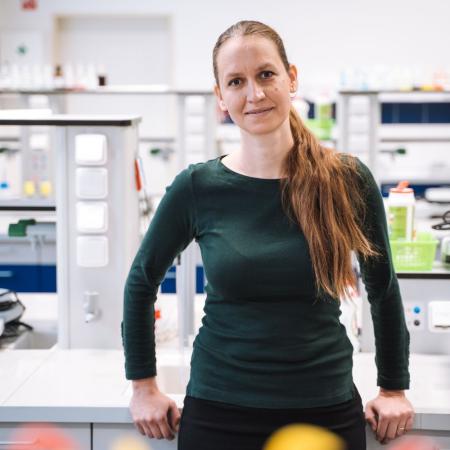
Dr. Pavla Perlíková and her UCT Prague research group, Medicinal chemistry of natural compound inspired scaffolds, received a five-year Czech Science Foundation JUNIOR STAR grant. Her project entitled Development of actin polymerization inhibitors as potential migrastatics will take place at UCT Prague from 2023-2027. It is one of the four successful JUNIOR STAR proposals from UCT Prague.
How difficult was it to write your JUNIOR STAR proposal? Did someone help you?
The project was based on a previously-submitted ERC proposal, created with great support from the Technology Centre of the Czech Academy of Sciences. When I already had completed that proposal, I modified it for the Czech Science Foundation JUNIOR STAR competition. During submission procedure, UCT Prague’s support was mostly in checking formalities.
Are you collaborating with someone on the project?
I rely mainly on collaboration with Professor Jan Brábek’s research group at the Biotechnology and Biomedicine Center in Vestec, but the Ludwig-Maximilians-Universität in Munich is also included.
What is the bottom line of your project?
Our goal is to develop new substances that are active against cell metastasis. We call such substances “migrastatics”. We will target the process of actin polymerization, related to the movement apparatus of cells. We will try to inhibit polymerization, and thus, tumour cells will not be able to move and leave the primary tumour. Our goal is to develop substances that will induce inhibition either by directly binding to actin or by targeting one of the regulators of its polymerization. This is the Arp2/3 complex. We found a potential binding site for one of its subunits that no one had tried targeting before. So there are no known substances that bind to it. We will use molecular docking to design potential structures that could bind there. We will verify whether they have any activity and we will further develop them, chemically.
JUNIOR STAR funding is for five years. What can be achieved in that timeframe?
In five years, we should be able to obtain information about the structures that bind to a selected binding site and have the required activity. We will know which parts of a molecule are essential for binding and which are not so that we can further modify the pharmacological properties of the molecule. I hope we will also learn more about the role of the Arp2/3 complex in tumour cell metastasis.
JUNIOR STAR grants are relatively generous for the Czech context. What will funding enable you to do?
Yes, funding is relatively generous and has an advantage over standard Czech Science Foundation programs because it also includes investment funds. So I can buy devices for equipping my laboratory. Of course, most funding goes to postdoc positions and doctoral candidate salaries.
Will you research team grow?
Yes, the team will include three doctoral candidates, one postdoc, and a number of external collaborators who will work on the biological part of the project.
I am glad that with the JUNIOR STAR proposal I managed to establish a sort of a collaborators’ network across UCT Prague. The Department of Informatics and Chemistry will be involved in the computing part, and the biological testing part will be performed at the Department of Biochemistry and Microbiology. It’s nice that the topic connects researchers across the university.
In a previous interview, you mentioned that you were a postdoc in Denmark and that you liked the way the laboratory worked there. Do you feel like you are emulating that style?
That should probably be judged by my students. We’re a very small group so far, so I hope everyone feels like they play a useful role. We try to have every group member fully involved both in our research and in the discussions how to proceed in the future.
It’s been two years since you’ve been at UCT Prague. Is there anything that has surprised you, positively or negatively?
I was definitely pleasantly surprised by how willing all colleagues are here; it’s a good environment. No task seems unsolvable. I was afraid it would be more bureaucratic. What bothers me most is the lack of space.
One doesn’t live only for and from science. What is your favourite lunch-place around campus?
In my opinion, the best restaurant nearby is U Topolů, but I don’t often go there for lunch because it’s a little far away. I can also recommend Technická menza in the CIIRC building—assuming it’s not overcrowded.
Where do you rest, at least mentally, away from research?
When I’m at home with my kids, I get completely disconnect from work. But it’s not quite rest. Lately, I discovered that orienteering racing makes me fully relaxed. I’m terribly sorry that I still haven’t been able to participate in the university orienteering events because they’re always scheduled on days when I have other obligations. I would love to participate in them someday, even though I would probably be the oldest runner.
Maybe it would be worth organizing such events for researchers.
I believe I could compete with the students as well. But so it happens that I’m always on my labs duty during these events.
I know that you also like running in nature. What do you enjoy about this?
I’ve only been doing orienteering for two years and I haven’t even run an official race yet. It’s mainly about relaxation for me. I get to know Prague forests with a map. What I enjoy about this is that one can be hidden alone in the forest. No one can see when I get lost and complaining about it. It’s also a kind of activity where you have to engage your head, so it’s not just about physical performance.

